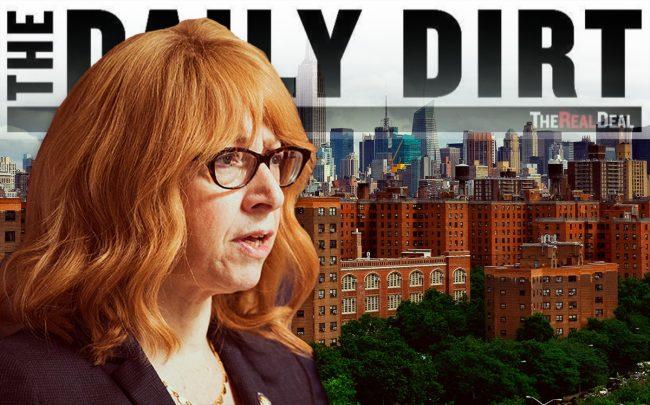
Linda Rosenthal and Stuyvesant Town-Peter Cooper Village (Credit: Brett Carlsen/Getty Images; Orjan F. Ellingvag/Corbis via Getty Images)
When New York restricted how landlords can increase rents on regulated apartments, some owners said they would leave units vacant. That may soon change.
Assembly member Linda Rosenthal proposed a bill that would fine landlords for keeping their vacant rent-stabilized apartments off the market, Georgia Kromrei reports. Landlords would face a monthly fee of 150 percent of the last legal rent after three months of vacancy. The fines would be used to create a new fund overseen by the state’s housing regulator to provide rental vouchers to the homeless.
Following the passage of the Housing Stability and Tenant Protection Act of 2019 in June, some landlords threatened to keep their regulated units vacant, citing their inability to invest in renovations and increase rents significantly. In July, Blackstone announced it would stop improvements at Stuyvesant Town, though it reversed course after some bad press and a promise by authorities to review the complex.
Small-landlord lobby group Community Housing Improvement Program called Rosenthal’s bill “political pandering” and said warehousing is a “rational decision to reduce the overall operational costs in order to maintain the long-term financial stability of the building for the residents who still live there.”
Rosenthal had indicated last month that she was focused on landlords who warehouse their regulated apartments as a way of pressuring Albany to allow greater rent hikes to pay for renovations. She referred to the practice as “a game of chicken.”
“When you become a landlord in a city as relentless as New York City, you enter into a social contract to make units available for rent,” Rosenthal said. “Landlords hope the legislature will flinch and we’ll change the law. But that’s not the plan.”
Hotels are bracing for the coronavirus.
As confirmed cases of COVID-19 continue to grow, hotel guests are canceling or postponing travel plans.
It appears the hotel industry is already starting to see an impact. Occupancy fell 2.1 percent year-over-year to 63.2 percent for the week ending Feb. 22, according to research firm STR. Occupancy rates in U.S. airport hotels dropped 4.8 percent during that week — the largest decline among location types tracked by STR.
Still, it’s a bit early to tell if drops in demand are directly connected to the outbreak, STR’s Jan Freitag said in a release late last month. After all, we’re only dealing with a week’s worth of data.
For now, hotels and their investors are taking a wait-and-see approach, Mary Diduch reports.
“Is this a temporary thing that causes major disruptions to travel patterns around the world? Who knows?” said KHP Capital Partners CEO Mike Depatie. “It’s definitely entering into our discussions.”
CLOSING TIME
Residential: The priciest residential closing recorded Wednesday was for a condo at 50 Bridge Park Drive in Brooklyn Heights, at $7 million.
Commercial: The most expensive commercial closing was for an office building at 330 Madison Avenue in Midtown, at $900 million.
BREAKING GROUND
The largest new building filing of the day was for a 36,767-square-foot residential building at 435 Hart Street in Bedford-Stuyvesant. Joanne
NEW TO THE MARKET
The priciest residential listing to hit the market was for a condo unit at 138 East 50th Street in Turtle Bay, at $10.5 million. Douglas Elliman’s Gail Sankarsingh has the listing. — Research by Mary Diduch
A thing we’ve learned…
According to construction tech startup Procore’s S-1 filing, the company paid $150 million to acquire Honest Buildings in July 2019. Thank you to James Kleimann, who unearthed this detail from the startup’s filing.
Elsewhere in New York
— Michael Bloomberg is out. The former New York City mayor quit the presidential race Wednesday, following Joe Biden’s sweeping victories Super Tuesday, the Washington Post reports. What a strange race this has been: One former NYC mayor, one current mayor … both out of the race within just a few months of throwing their hats into the ring.
— In other presidential news, New York will hold a Republican primary for the nation’s highest office, Politico reports. Why? President Donald Trump was the only candidate to qualify.
— Salt Bae, a restaurant chain born from viral Instagram videos of a man trickling salt down his arm onto food people are about to eat, is bad, Gothamist reports. There’s something called a Wet Burger, which you can have covered in gold leaf for $100. ¯_(ツ)_/¯
